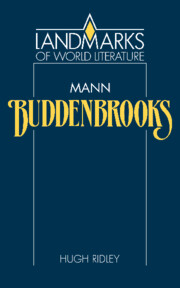Book contents
- Frontmatter
- Contents
- Acknowledgements
- Chronology
- Chronology of Buddenbrooks
- 1 Life and works
- 2 Retrospect on the nineteenth century
- 3 The evolution of the novel
- 4 The theme of decline
- 5 Stages in decline
- 6 Thomas Buddenbrook
- 7 Narrative technique
- 8 The Buddenbrooks' decline: a typical story?
- 9 Literary background and reading public
- 10 Buddenbrooks and the ‘crisis of the novel’
- Suggestions for further reading
8 - The Buddenbrooks' decline: a typical story?
Published online by Cambridge University Press: 15 December 2009
- Frontmatter
- Contents
- Acknowledgements
- Chronology
- Chronology of Buddenbrooks
- 1 Life and works
- 2 Retrospect on the nineteenth century
- 3 The evolution of the novel
- 4 The theme of decline
- 5 Stages in decline
- 6 Thomas Buddenbrook
- 7 Narrative technique
- 8 The Buddenbrooks' decline: a typical story?
- 9 Literary background and reading public
- 10 Buddenbrooks and the ‘crisis of the novel’
- Suggestions for further reading
Summary
There are several reasons why this question should be addressed. It was, for a start, a perspective on his own work which Mann welcomed. Not only did his initial treatment of his material point in the direction of representativeness, understanding himself and his family as part of a larger whole: his social position in later life, especially during the Weimar Republic and as a prominent member of the intellectual community which had left Hitler's Germany, made him particularly anxious to achieve representative quality in his works. In the famous letter of 1936 to the University of Bonn (whose rector had just found him unworthy to hold an honorary degree in Hitler's Germany) Mann wrote that, even at a time when National Socialism had turned him into an exile and outsider, he was ‘far sooner born to be a representative than a martyr’. It was an aspiration which lay behind his entire life and works.
This ambition coloured his own reading of Buddenbrooks. In 1901 when he was launching it onto the world, Mann asked Grautoff to portray the novel as being typical of the nation, although neither Mann nor his friend understood ‘Germanness’ to mean anything parochial or hostile to other cultures: it was the status of representativeness which Mann had in mind. In 1926, when Buddenbrooks had become widely known to a European public (he was to receive the Nobel Prize for Literature in 1929), Mann extended his idea of representativeness to include this new public.
- Type
- Chapter
- Information
- Mann: Buddenbrooks , pp. 86 - 93Publisher: Cambridge University PressPrint publication year: 1987

